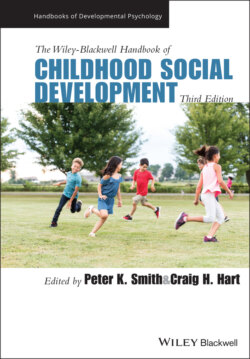Читать книгу The Wiley-Blackwell Handbook of Childhood Social Development - Группа авторов - Страница 101
CHAPTER SEVEN Anthropological Perspectives on Social Development
ОглавлениеHeather Montgomery
While rarely referred to as “social development” within anthropology the ways that children develop and learn about their worlds, how they interact with others and how, through these interactions, grow up to be competent and successful members of their societies and cultures, have been much studied by anthropologists. There is a long‐standing interest in socialization, particularly among American anthropologists, who have focused on how childrearing practices shape children’s identities and social development and, more recently, on how children learn the skills necessary to work and contribute to their communities. This work has developed in parallel with psychology, drawing heavily on the findings and insights from social psychology and contributing cross‐cultural perspectives and examples to discussions of how children learn and develop. There is an excellent summary and discussion of this work in LeVine (2007), and an invaluable reader with extracts from core texts in the field edited by LeVine and New (2008).
There is also another more recent development in anthropological thinking about childhood, closely linked to the New Social Studies of Childhood movement that developed in Europe in the 1990s (James & Prout, 1997). Anthropologists pursing this strand of theorization and research are less interested in studies of socialization, and how parents raise children, and are more concerned with the importance of children as agents, social actors, and informants: as human “beings” rather than human “becomings.” Children, within this paradigm, are of interest to anthropologists for their lives and experiences as children, rather than their future as fully developed adults. This theorization is based on the idea that “the child” is a social construction rather than a universal biological entity. It has been largely critical of psychology, dismissing it as ethnocentric and future focused and instead draws on politics, especially ideas of children’s rights, to frame discussions of children’s experiences (Montgomery, 2009).
In this chapter I will discuss these two different “anthropologies of childhood” and look at how they have both contributed to understandings of children’s social development – and problematized them. I will then look at the tensions between them, as well as areas of contemporary and future overlap, and at the benefits of combining multiple perspectives to create vibrant and holistic studies of childhood which move beyond disciplinary backgrounds.
